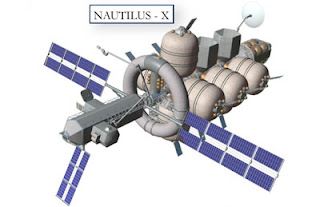Space Colonization As The Savior Of Progress
The idea of Progress, as defined by J. B. Bury, proclaims that "civilization has moved, is moving, and will move in a desirable direction". Ever since the 1960s the belief in Progress has been waning and some would say that it has been completely lost to the current generation. Going beyond Bury's definition, Taylor E. Dark III provides three mutually reinforcing and interlocking premises:
In his excellent paper, Reclaiming The Future: Space Advocacy And The Idea Of Progress, Dark proposes that the space program was insulated from the crisis in the idea of progress in the late 60s and because of this, the new pro-space ideology was just a reaction to social change.
To me, this kinda sounds like fearful Americans, desperate to hold on to their beliefs, turning to the only avenue of society where they can still openly talk about the future with a sense of awe and wonder. This may sound harsh, but at least I'm not suggesting it's all just narcissistic phantasy.
Dark has a different explanation for the desperation: the cancellation of Apollo with no plans to follow on with anything else:
With the cancellation of the Space Shuttle (and Constellation), that same sense of anxiety and urgency can be felt in today's pro-space literature.. but perhaps that's just because we're all sick of waiting.
My favorite part of Dark's paper comes in the concluding remarks:
Oh the sweet bitter irony. Why wouldn't anyone suggest that maybe there are limits to how far terrestrial technology can advance? Why would one assume that the advancement of terrestrial technology would immediately imply that space-going would become any easier? And what would this "faith that terrestrial technology will continue to advance" be called?
I guess you'd call that Progress.
1. NO LIMITS. There are no fundamental limits – nor should there be – on the collective human capacity to grow, no matter how growth is defined (which may be in terms of knowledge, wealth, power, population, or morality). Progress is endless (or at least indefinite for all practical purposes).
2. ALL GOOD THINGS GO TOGETHER. Advancements in science and technology, and the resulting mastery over nature, expand our knowledge, wealth, and power, and, in so doing, bring improvements in the moral, political, and spiritual character of the human race. The elements of progress are linked to one another and mutually reinforcing.
3. INNATE DIRECTIONALITY. There exist developmental tendencies, rooted in societal, psychological, or biological mechanisms, that make it far more likely that human civilization will move "upward," toward greater control and understanding of nature and ourselves, rather than “downward” toward chaos and entropy. Progress is, if not inevitable, always highly probable.
In his excellent paper, Reclaiming The Future: Space Advocacy And The Idea Of Progress, Dark proposes that the space program was insulated from the crisis in the idea of progress in the late 60s and because of this, the new pro-space ideology was just a reaction to social change.
To me, this kinda sounds like fearful Americans, desperate to hold on to their beliefs, turning to the only avenue of society where they can still openly talk about the future with a sense of awe and wonder. This may sound harsh, but at least I'm not suggesting it's all just narcissistic phantasy.
Dark has a different explanation for the desperation: the cancellation of Apollo with no plans to follow on with anything else:
The irony was that they embraced this belief at the very moment that the Apollo program was coming to a close, and the future of NASA and space travel becoming increasingly uncertain. Thus, a strong edge of anxiety and urgency was introduced into the writings of space advocates. The means to ensure progress had been found, but would soon be lost forever if government policy was not properly adjusted. This combination of certainty about the path toward redemption alongside anxiety about the possibility of missing a singular opportunity energized the new pro-space literature, and encouraged the growth of an accompanying space advocacy movement.
With the cancellation of the Space Shuttle (and Constellation), that same sense of anxiety and urgency can be felt in today's pro-space literature.. but perhaps that's just because we're all sick of waiting.
My favorite part of Dark's paper comes in the concluding remarks:
If advances in bio-technology, artificial intelligence, and nano-technology allow humanity to prosper on Earth to a greater extent than ever before, the urgency of the space endeavor is lost. In fact, if one has faith that terrestrial technology will continue to advance, the idea of spending billions of dollars on unprofitable space ventures becomes even less attractive.
Why not just wait until new technologies reduce the cost of space flight to reasonable levels? At that point, normal market mechanisms (such as tourist demand) may allow major increases in human space flight without government intervention. But then, of course, no grandiose ideology of progress will be required, any more than such an ideology was required to people the formerly arid deserts of the American southwest once water and air conditioning became widely available.
Oh the sweet bitter irony. Why wouldn't anyone suggest that maybe there are limits to how far terrestrial technology can advance? Why would one assume that the advancement of terrestrial technology would immediately imply that space-going would become any easier? And what would this "faith that terrestrial technology will continue to advance" be called?
I guess you'd call that Progress.


Comments
Post a Comment